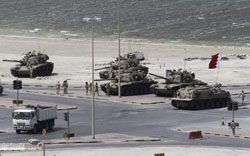| NSPM in English | |||
Bahrain: U.S. Backs Saudi Military Intervention |
 |
 |
 |
| четвртак, 17. март 2011. | |
|
(Global Research, March 16, 2011)
On March 14 Saudi Arabia and its Gulf Cooperation Council partner the United Arab Emirates deployed 1,000 troops, 500 security personnel and armored troop carriers across the 25-mile King Fahd Causeway to Bahrain to shore up their fellow monarchy after a month of protests against the Al Khalifa dynasty. The following day the Bahraini government declared a three-month state of emergency and authorized the military "to take necessary steps to restore national security." On March 16 government security forces staged a violent crackdown against protesters in the nation's capital with tanks, armored personnel carriers and helicopters, killing at least two people and injuring hundreds. In the interim U.S. Secretary of Defense Robert Gates visited Bahrain on March 11 and 12 and met with King Hamad bin Isa al-Khalifa and Crown Prince Salman bin Hamad bin Isa al-Khalifa. The first is Commander-in-Chief and the second Deputy Supreme Commander of the Bahrain Defence Force. The Bahraini monarch underwent military training with the British Army at the now-defunct Mons Officer Cadet School and later attended the United States Army Command and General Staff College at Fort Leavenworth, Kansas, graduating in 1973. The Pentagon chief and former Central Intelligence Agency director was in the company of men who spoke his language. Gates commented approvingly of his hosts: "I am convinced they both are serious about real reform. I think that the concern now is that it’s important that they have somebody to talk to, and that the opposition be willing to sit down with the government and carry this process forward."[1] He praised the king's and prince's "willingness to engage with the opposition," lauding their efforts as "a model for the entire region" - the Middle East and North Africa. Bahrain lies directly across the Persian Gulf from Iran. The Defense Secretary confirmed that there had been "much talk of Iran" between him and his royal interlocutors and added: “One of the issues under discussion with respect to Libya, obviously, is a no-fly zone....If we are directed to impose a no-fly zone, we have the resources to do it.”[2] On March 7 the foreign ministers of the Gulf Cooperation Council member states - Bahrain, Kuwait, Oman, Qatar, Saudi Arabia and the United Arab Emirates - called for imposing a no-fly zone over Libya, with Emirati Foreign Minister Sheik Abdullah bin Zayed al-Nahyan emoting: "We appeal to the international community, especially the Security Council, to meet its historical responsibility to protect this dear people." A week after the above display of unconvincing solicitude, leading members of the organization sent troops to Bahrain to suppress protests against the hereditary autocracy. Last September the Financial Times reported that the U.S. had struck deals to provide four members of the Gulf Cooperation Council - Saudi Arabia, the United Arab Emirates, Kuwait and Oman - with $123 billion worth of arms in a dramatic move to confront Iran in the Persian Gulf. Saudi Arabia accounts for over half the total, $67 billion for 84 F-15 jets, 70 Apache gunships, 72 Black Hawk helicopters, 36 light helicopters and thousands of laser-guided smart bombs, the largest weapons deal in U.S. history. Even before those transactions are finalized, the Stockholm International Peace Research Institute documented last December that Washington accounted for 54 percent of arms sales to Persian Gulf states between 2005 and 2009 and France 21 percent. Gates flew home to Washington on March 12 from the Bahraini capital of Manama, ending a trip that started in Afghanistan five days before, after which he went to U.S. Africa Command headquarters in Stuttgart, Germany where he officiated over the transfer of command from General William Ward to General Carter Ham, and to NATO Headquarters in Brussels where he engaged in two days of meetings with his 27 fellow Alliance defense chiefs and those of another 20 nations providing troops for NATO's International Security Assistance Force in Afghanistan. Pentagon Press Secretary Geoff Morrell stated of U.S. relations with allies in the Middle East region: “All of the...deep strategic interests we have with them remain the same as they were six months ago.”[3] That Saudi military forces entered Bahrain two days after Secretary Gates left would lead any sensible person to draw the conclusion that the Pentagon chief had discussed more than Iran and Libya with the kingdom's top two government and defense officials. Though discussions on Iran would not have been unrelated to those concerning a U.S.-backed deployment of Saudi and other Gulf Cooperation Council forces to Bahrain, as some 70-75 percent of Bahrain's population is Shi'a Muslim by way of confessional background although the ruling family is Sunni.
The U.S. Fifth Fleet, one of six used by Washington to patrol the world's seas and oceans, is headquartered near Manama, where between 4,000-6,000 American military personnel are stationed. Unlike Tunisia and Egypt, U.S. military partners but not hosts of American bases, Bahrain is vital to U.S. international military and energy strategy, and allowing a doctrinal affinity to in any manner augment Iran's influence in its Persian Gulf neighbor is anathema to the White House, State Department and Pentagon. The Fifth Fleet's area of responsibility encompasses 2.5 million square miles of water, including the Persian Gulf, the Red Sea, the Gulf of Oman, the Arabian Sea and the Indian Ocean as far south as Kenya.[4] Aircraft carriers, destroyers and other warships are assigned to it on a rotational basis and the fleet is the naval component of U.S. Central Command, sharing a commander and headquarters in Bahrain with U.S. Naval Forces Central Command. Central Command's purview stretches from Egypt in the west to Kazakhstan, bordering Russia and China, in the east. The Fifth Fleet has approximately 30,000 personnel stationed across the region. The geopolitical importance of Bahrain was demonstrated when the U.S.'s top military officer, chairman of the Joint Chiefs of Staff Admiral Michael Mullen, visited several nations in the Middle East and the Horn of Africa last month: Israel, Jordan, Saudi Arabia, Qatar, the United Arab Emirates, Djibouti and Kuwait, with a last-minute stop in Bahrain not listed on his itinerary. Mullen inspected the Combined Joint Task Force - Horn of Africa at Camp Lemonnier in Djibouti, the first major American military base on the African continent, now assigned to U.S. Africa Command. While in Saudi Arabia, he characterized Iran as "a country that continues to foment instability in the region and take advantage of every opportunity." “There are always concerns in this region with Iran. Certainly the United States has them, as well as all the regional players. Certainly that was part of the discussion today [February 21] with the Saudis.”[5] A discussion that was held with Prince Mohammed bin Nayef, Deputy Interior Minister; Prince Miteb bin Abdullah, commander of the National Guard; Prince Khalid bin Sultan bin Abdul Aziz al-Saud, Assistant Minister for Defense and Aviation; and Lieutenant General Husein Abdullah al-Qubail, Deputy Chief of the General Staff. Mullen was cited as saying the talks "focused largely on the tumult in Bahrain," with him stating: In Bahrain on February 25 he “reaffirmed our strong commitment to our military relationship with the Bahraini defense forces,” according to his spokesman. He also commended the Bahraini royal family "for the very measured way they have been handling the popular crisis here,” although several hundred protesters have now been killed and wounded, and praised the government for the "giant leaps” it has taken in recent years.[7] Mullen visited the Marine Corps Forces Central Command [MARFORCENT] Forward element at the Naval Support Activity Bahrain base, home to U.S. Naval Forces Central Command and the U.S. Fifth Fleet. The new Marine headquarters "stood up in November to bring Marine Corps Forces Central Command what its other sister services already have: a forward element within the 20-nation Centcom area of operations." "Exactly how many Marines ultimately will join the element is classified, but...developments underway" are seen "as a sign of MARFORCENT’s long-term commitment to strengthening partnerships and protecting U.S. interests in the region."[8] Ten days earlier North Atlantic Treaty Organization Deputy Secretary General Claudio Bisogniero addressed a conference in Qatar (immediately southeast of Bahrain), the fourth Ambassadorial Conference of NATO's Istanbul Cooperation Initiative, also attended by Secretary General Anders Fogh Rasmussen. Concerns expressed in Bisogniero's keynote address were capsulized by a local newspaper as follows: "Gulf nations are crucial to world energy supplies and their security supplies are also important....Since 50 percent of world energy supplies transit through the Gulf region, it is Nato’s main concern to ensure these supplies."[9] The Istanbul Cooperation Initiative was created at the NATO summit in Turkey in 2004 to complement the upgrading of the Mediterranean Dialogue partnership with Israel, Egypt, Tunisia, Algeria, Jordan, Mauritania and Morocco to the level of the Partnership for Peace program that graduated twelve Eastern European candidates to full NATO membership from 1999-2009, an unprecedented seven at the Istanbul summit seven years ago, with new bilateral partnerships with Gulf Cooperation Council members Bahrain, Kuwait, Oman, Qatar, Saudi Arabia and the United Arab Emirates. In NATO's words at the time: "NATO leaders decided to elevate the Alliance's Mediterranean Dialogue to a genuine partnership and to launch the Istanbul Cooperation Initiative with selected countries in the broader region of the Middle East."[10] Last month NATO's second top civilian leader "welcomed Istanbul Cooperation Initiative (ICI) partners Qatar, Bahrain, Kuwait and the United Arab Emirates, showing his interest in deepening energy security and cooperation in the Gulf region also with Oman and Saudi Arabia."[11] In 2008 a NATO-Bahrain Public Diplomacy Conference was held in Manama. "The Conference brought together the Secretary General of NATO, the North Atlantic Council, the Deputy Secretary General of NATO, the Chairman of the NATO Military Committee and NATO officials, with government representatives, academics and senior scholars from countries in the Gulf region invited in the Istanbul Cooperation Initiative."[12] The groundwork has been laid for U.S. and allied military intervention in the Persian Gulf.[13] The day after Saudi and Emirati military forces arrived in Bahrain, several thousand protesters descended on the Saudi embassy to demonstrate their opposition to the intervention. As the Reuters news agency reported, "Bahrainis are concerned that their tiny island could become a proxy battleground for a wider stand-off between the Sunni-ruled Gulf Arab countries, all U.S. allies, and Shi'ite-ruled Iran, a U.S. foe." The Iranian Foreign Ministry referred to the foreign military deployment in Bahrain as "unacceptable" and the Bahraini king recalled his ambassador from Tehran in response. Two years ago Saudi Arabia engaged in its true first war, that against Houthi militias in northern Yemen. On December 14 of 2009 BBC News reported that 70 Yemeni civilians had been killed in a Saudi bombing raid on the village of Bani Maan. Houthi sources on the same day claimed that "US fighter jets have attacked Yemen’s Sa’ada Province” and “US fighter jets have launched 28 attacks on the northwestern province of Sa’ada.”[14] The U.S. is no less complicit in the Saudi military intervention currently underway in Bahrain. Pentagon spokesman Colonel David Lapan stated the U.S. had been "informed" of but not "consulted" on the Saudi deployment, but his verbal sleight of hand was solely intended to cozen the uninformed and unwary given the recent visits to Bahrain by the head of the Pentagon and America's top military commander, who decidedly were not there to discuss the weather. [1] U.S. Department of Defense, March 12, 2011 [2] Ibid. [3] Ibid. [4] Arabian Sea: Center Of West’s 21st Century War, October 25, 2010 [5] U.S. Department of Defense, February 21, 2011 [6] Ibid. [7] Joint Chiefs of Staff, February 25, 2011 [8] Marine Forward Element Set Up to Help in Middle East [9] The Peninsula, February 16, 2011 [10] North Atlantic Treaty Organization, June 29, 2004 [11] Ibid. [12] North Atlantic Treaty Organization, April 28, 2008 [13] NATO’s Role In The Military Encirclement Of Iran, February 10, 2010 [14] Yemen: Pentagon’s War On The Arabian Peninsula, December 15, 2009 |
Остали чланци у рубрици
- Playing With Fire in Ukraine
- Kosovo as a res extra commercium and the alchemy of colonization
- The Balkans XX years after NATO aggression: the case of the Republic of Srpska – past, present and future
- Из архиве - Remarks Before the Foreign Affairs Committee of the European Parliament
- Dysfunction in the Balkans - Can the Post-Yugoslav Settlement Survive?
- Serbia’s latest would-be savior is a modernizer, a strongman - or both
- Why the Ukraine Crisis Is the West’s Fault
- The Ghosts of World War I Circle over Ukraine
- Nato's action plan in Ukraine is right out of Dr Strangelove
- Why Yanukovych Said No to Europe

.jpg)








 Bahrain: U.S. Backs Saudi Military Intervention, Conflict With Iran
Bahrain: U.S. Backs Saudi Military Intervention, Conflict With Iran A Bahraini protester quoted by Reuters on March 15 commented on the Saudi-led military incursion this way: "It's part of a regional plan and they're fighting on our (land). If the Americans were men they would go and fight Iran directly but not in our country."
A Bahraini protester quoted by Reuters on March 15 commented on the Saudi-led military incursion this way: "It's part of a regional plan and they're fighting on our (land). If the Americans were men they would go and fight Iran directly but not in our country."










